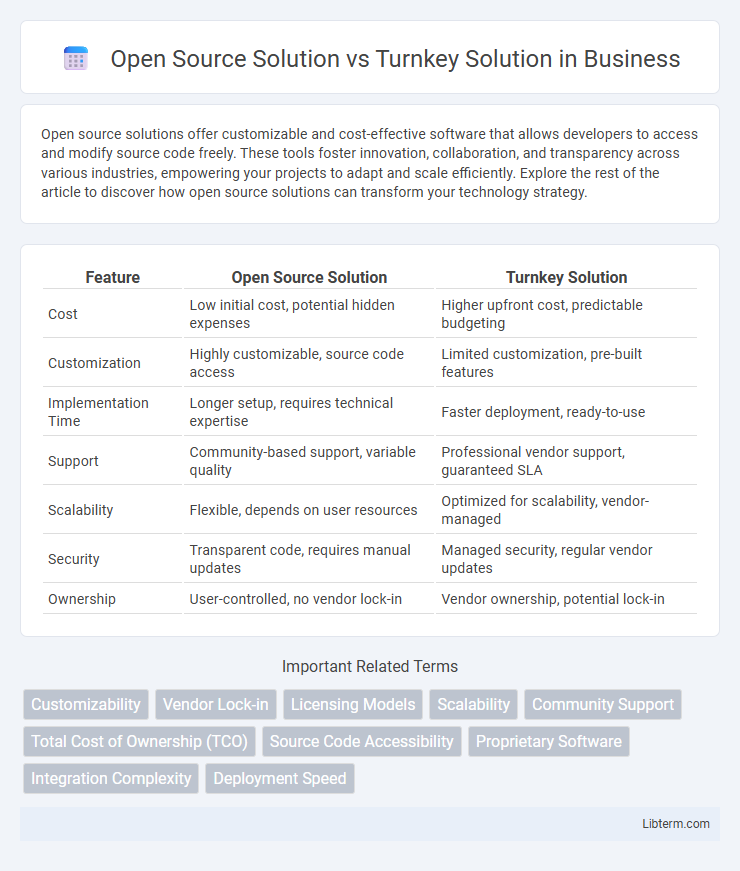Open source solutions offer customizable and cost-effective software that allows developers to access and modify source code freely. These tools foster innovation, collaboration, and transparency across various industries, empowering your projects to adapt and scale efficiently. Explore the rest of the article to discover how open source solutions can transform your technology strategy.
Table of Comparison
| Feature | Open Source Solution | Turnkey Solution |
|---|---|---|
| Cost | Low initial cost, potential hidden expenses | Higher upfront cost, predictable budgeting |
| Customization | Highly customizable, source code access | Limited customization, pre-built features |
| Implementation Time | Longer setup, requires technical expertise | Faster deployment, ready-to-use |
| Support | Community-based support, variable quality | Professional vendor support, guaranteed SLA |
| Scalability | Flexible, depends on user resources | Optimized for scalability, vendor-managed |
| Security | Transparent code, requires manual updates | Managed security, regular vendor updates |
| Ownership | User-controlled, no vendor lock-in | Vendor ownership, potential lock-in |
Introduction to Open Source and Turnkey Solutions
Open source solutions provide customizable software with source code access, enabling businesses to tailor applications to specific needs while fostering community-driven innovation and cost efficiency. Turnkey solutions offer comprehensive, ready-to-use systems designed for immediate deployment, minimizing setup time and requiring less technical expertise. Selecting between these options depends on factors like budget, control requirements, scalability, and time-to-market priorities.
Key Features of Open Source Solutions
Open source solutions provide customizable software with access to the source code, enabling businesses to modify features to fit specific needs and integrate seamlessly with existing systems. They often offer strong community support, frequent updates, and transparency in security since vulnerabilities can be identified and addressed quickly by contributors worldwide. Moreover, open source solutions generally reduce costs by eliminating licensing fees and fostering scalability through flexible deployment options.
Core Characteristics of Turnkey Solutions
Turnkey solutions deliver fully integrated and ready-to-use products, designed for immediate deployment with minimal customization. They emphasize ease of implementation, comprehensive customer support, and pre-configured features tailored to specific industry needs. This approach reduces time-to-market and operational complexity compared to open source alternatives that require extensive setup and ongoing maintenance.
Cost Comparison: Open Source vs Turnkey
Open source solutions offer lower upfront costs since they eliminate licensing fees, but may require additional investment in customization, integration, and ongoing maintenance. Turnkey solutions typically involve higher initial expenses due to bundled software and services, yet provide predictable budgets with included support and faster deployment. Evaluating total cost of ownership (TCO) reveals open source can be more cost-effective for organizations with in-house technical expertise, whereas turnkey suits businesses seeking ready-made, fully supported systems.
Customization and Flexibility Analysis
Open source solutions offer extensive customization and flexibility by allowing developers to modify source code and tailor features to specific business needs. Turnkey solutions provide pre-configured, ready-to-use systems with limited customization options, prioritizing speed of deployment and ease of use. Businesses requiring tailored workflows and scalable integration often prefer open source, whereas turnkey solutions suit those needing straightforward, out-of-the-box functionality.
Implementation and Deployment Speed
Open source solutions offer flexible customization but often require longer implementation and deployment times due to the need for configuration and integration efforts. Turnkey solutions deliver faster deployment by providing pre-configured, ready-to-use systems that minimize setup complexity. Organizations prioritizing rapid time-to-market typically prefer turnkey solutions, while those seeking tailored functionality may opt for open source despite extended implementation periods.
Long-Term Maintenance and Support
Open source solutions offer greater flexibility and community-driven updates for long-term maintenance, allowing businesses to customize and scale without vendor lock-in. Turnkey solutions provide dedicated vendor support and consistent maintenance services that simplify updates and reduce operational overhead. Weighing the trade-offs, companies seeking control and adaptability may prefer open source, while those prioritizing streamlined support and reliability often choose turnkey systems.
Security and Compliance Considerations
Open source solutions provide greater transparency, allowing organizations to audit code for vulnerabilities and customize security measures to meet specific compliance requirements such as GDPR or HIPAA. Turnkey solutions often include built-in compliance certifications and managed security protocols, reducing the burden on internal teams but limiting customization and control. Evaluating regulatory demands and in-house security expertise is critical when choosing between the flexibility of open source security and the standardized protection of turnkey platforms.
Scalability and Future Growth Potential
Open source solutions offer high scalability and flexibility, allowing businesses to customize and expand features as their needs grow without licensing constraints. Turnkey solutions provide quick deployment with predefined scalability limits, which can restrict adaptability for long-term growth and evolving requirements. For future growth potential, open source platforms enable continuous innovation and integration with emerging technologies, making them ideal for businesses anticipating rapid expansion and changing market demands.
Choosing the Right Solution: Factors to Consider
Choosing the right solution between open source and turnkey depends on factors such as budget, customization needs, and technical expertise. Open source solutions offer flexibility and cost-effectiveness but require in-house development and maintenance, while turnkey solutions provide ready-made, fully supported products with faster deployment but higher initial costs. Evaluating project complexity, scalability requirements, and long-term support ensures alignment with business goals and resource availability.
Open Source Solution Infographic

 libterm.com
libterm.com